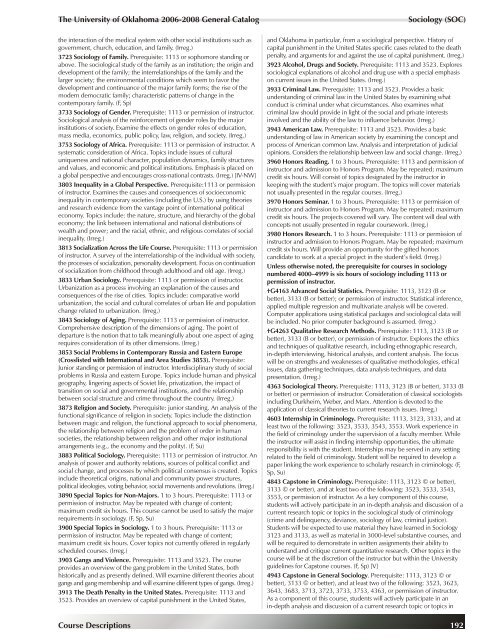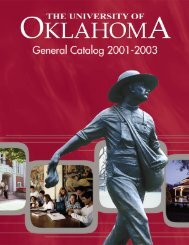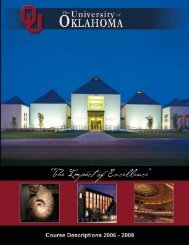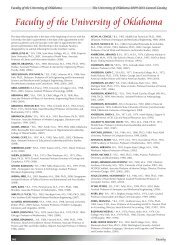ART - Catalog - University of Oklahoma
ART - Catalog - University of Oklahoma
ART - Catalog - University of Oklahoma
Create successful ePaper yourself
Turn your PDF publications into a flip-book with our unique Google optimized e-Paper software.
The Uni ver sity <strong>of</strong> <strong>Oklahoma</strong> 2006-2008 Gen eral Cat a log<br />
Sociology (SOC)<br />
the interaction <strong>of</strong> the medical system with other social institutions such as<br />
government, church, education, and family. (Irreg.)<br />
3723 Sociology <strong>of</strong> Family. Prerequisite: 1113 or sophomore standing or<br />
above. The sociological study <strong>of</strong> the family as an institution; the origin and<br />
development <strong>of</strong> the family; the interrelationships <strong>of</strong> the family and the<br />
larger society; the environmental conditions which seem to favor the<br />
development and continuance <strong>of</strong> the major family forms; the rise <strong>of</strong> the<br />
modern democratic family; characteristic patterns <strong>of</strong> change in the<br />
contemporary family. (F, Sp)<br />
3733 Sociology <strong>of</strong> Gender. Prerequisite: 1113 or permission <strong>of</strong> instructor.<br />
Sociological analysis <strong>of</strong> the reinforcement <strong>of</strong> gender roles by the major<br />
institutions <strong>of</strong> society. Examine the effects on gender roles <strong>of</strong> education,<br />
mass media, economics, public policy, law, religion, and society. (Irreg.)<br />
3753 Sociology <strong>of</strong> Africa. Prerequisite: 1113 or permission <strong>of</strong> instructor. A<br />
systematic consideration <strong>of</strong> Africa. Topics include issues <strong>of</strong> cultural<br />
uniqueness and national character, population dynamics, family structures<br />
and values, and economic and political institutions. Emphasis is placed on<br />
a global perspective and encourages cross-national contrasts. (Irreg.) [IV-NW]<br />
3803 Inequality in a Global Perspective. Prerequisite:1113 or permission<br />
<strong>of</strong> instructor. Examines the causes and consequences <strong>of</strong> socioeconomic<br />
inequality in contemporary societies (including the U.S.) by using theories<br />
and research evidence from the vantage point <strong>of</strong> international political<br />
economy. Topics include: the nature, structure, and hierarchy <strong>of</strong> the global<br />
economy; the link between international and national distributions <strong>of</strong><br />
wealth and power; and the racial, ethnic, and religious correlates <strong>of</strong> social<br />
inequality. (Irreg.)<br />
3813 Socialization Across the Life Course. Prerequisite: 1113 or permission<br />
<strong>of</strong> instructor. A survey <strong>of</strong> the interrelationship <strong>of</strong> the individual with society,<br />
the processes <strong>of</strong> socialization, personality development. Focus on continuation<br />
<strong>of</strong> socialization from childhood through adulthood and old age. (Irreg.)<br />
3833 Urban Sociology. Prerequisite: 1113 or permission <strong>of</strong> instructor.<br />
Urbanization as a process involving an explanation <strong>of</strong> the causes and<br />
consequences <strong>of</strong> the rise <strong>of</strong> cities. Topics include: comparative world<br />
urbanization, the social and cultural correlates <strong>of</strong> urban life and population<br />
change related to urbanization. (Irreg.)<br />
3843 Sociology <strong>of</strong> Aging. Prerequisite: 1113 or permission <strong>of</strong> instructor.<br />
Comprehensive description <strong>of</strong> the dimensions <strong>of</strong> aging. The point <strong>of</strong><br />
departure is the notion that to talk meaningfully about one aspect <strong>of</strong> aging<br />
requires consideration <strong>of</strong> its other dimensions. (Irreg.)<br />
3853 Social Problems in Contemporary Russia and Eastern Europe<br />
(Crosslisted with International and Area Studies 3853). Prerequisite:<br />
Junior standing or permission <strong>of</strong> instructor. Interdisciplinary study <strong>of</strong> social<br />
problems in Russia and eastern Europe. Topics include human and physical<br />
geography, lingering aspects <strong>of</strong> Soviet life, privatization, the impact <strong>of</strong><br />
transition on social and governmental institutions, and the relationship<br />
between social structure and crime throughout the country. (Irreg.)<br />
3873 Religion and Society. Prerequisite: junior standing. An analysis <strong>of</strong> the<br />
functional significance <strong>of</strong> religion in society. Topics include the distinction<br />
between magic and religion, the functional approach to social phenomena,<br />
the relationship between religion and the problem <strong>of</strong> order in human<br />
societies, the relationship between religion and other major institutional<br />
arrangements (e.g., the economy and the polity). (F, Su)<br />
3883 Political Sociology. Prerequisite: 1113 or permission <strong>of</strong> instructor. An<br />
analysis <strong>of</strong> power and authority relations, sources <strong>of</strong> political conflict and<br />
social change, and processes by which political consensus is created. Topics<br />
include theoretical origins, national and community power structures,<br />
political ideologies, voting behavior, social movements and revolutions. (Irreg.)<br />
3890 Special Topics for Non-Majors. 1 to 3 hours. Prerequisite: 1113 or<br />
permission <strong>of</strong> instructor. May be repeated with change <strong>of</strong> content;<br />
maximum credit six hours. This course cannot be used to satisfy the major<br />
requirements in sociology. (F, Sp, Su)<br />
3900 Special Topics in Sociology. 1 to 3 hours. Prerequisite: 1113 or<br />
permission <strong>of</strong> instructor. May be repeated with change <strong>of</strong> content;<br />
maximum credit six hours. Cover topics not currently <strong>of</strong>fered in regularly<br />
scheduled courses. (Irreg.)<br />
3903 Gangs and Violence. Prerequisite: 1113 and 3523. The course<br />
provides an overview <strong>of</strong> the gang problem in the United States, both<br />
historically and as presently defined. Will examine different theories about<br />
gangs and gang membership and will examine different types <strong>of</strong> gangs. (Irreg.)<br />
3913 The Death Penalty in the United States. Prerequisite: 1113 and<br />
3523. Provides an overview <strong>of</strong> capital punishment in the United States,<br />
and <strong>Oklahoma</strong> in particular, from a sociological perspective. History <strong>of</strong><br />
capital punishment in the United States specific cases related to the death<br />
penalty, and arguments for and against the use <strong>of</strong> capital punishment. (Irreg.)<br />
3923 Alcohol, Drugs and Society. Prerequisite: 1113 and 3523. Explores<br />
sociological explanations <strong>of</strong> alcohol and drug use with a special emphasis<br />
on current issues in the United States. (Irreg.)<br />
3933 Criminal Law. Prerequisite: 1113 and 3523. Provides a basic<br />
understanding <strong>of</strong> criminal law in the United States by examining what<br />
conduct is criminal under what circumstances. Also examines what<br />
criminal law should provide in light <strong>of</strong> the social and private interests<br />
involved and the ability <strong>of</strong> the law to influence behavior. (Irreg.)<br />
3943 American Law. Prerequisite: 1113 and 3523. Provides a basic<br />
understanding <strong>of</strong> law in American society by examining the concept and<br />
process <strong>of</strong> American common law. Analysis and interpretation <strong>of</strong> judicial<br />
opinions. Considers the relationship between law and social change. (Irreg.)<br />
3960 Honors Reading. 1 to 3 hours. Prerequisite: 1113 and permission <strong>of</strong><br />
instructor and admission to Honors Program. May be repeated; maximum<br />
credit six hours. Will consist <strong>of</strong> topics designated by the instructor in<br />
keeping with the student’s major program. The topics will cover materials<br />
not usually presented in the regular courses. (Irreg.)<br />
3970 Honors Seminar. 1 to 3 hours. Prerequisite: 1113 or permission <strong>of</strong><br />
instructor and admission to Honors Program. May be repeated; maximum<br />
credit six hours. The projects covered will vary. The content will deal with<br />
concepts not usually presented in regular coursework. (Irreg.)<br />
3980 Honors Research. 1 to 3 hours. Prerequisite: 1113 or permission <strong>of</strong><br />
instructor and admission to Honors Program. May be repeated; maximum<br />
credit six hours. Will provide an opportunity for the gifted honors<br />
candidate to work at a special project in the student’s field. (Irreg.)<br />
Unless otherwise noted, the prerequisite for courses in sociology<br />
numbered 4000–4999 is six hours <strong>of</strong> sociology including 1113 or<br />
permission <strong>of</strong> instructor.<br />
†G4163 Advanced Social Statistics. Prerequisite: 1113, 3123 (B or<br />
better), 3133 (B or better); or permission <strong>of</strong> instructor. Statistical inference,<br />
applied multiple regression and multivariate analysis will be covered.<br />
Computer applications using statistical packages and sociological data will<br />
be included. No prior computer background is assumed. (Irreg.)<br />
†G4263 Qualitative Research Methods. Prerequisite: 1113, 3123 (B or<br />
better), 3133 (B or better), or permission <strong>of</strong> instructor. Explores the ethics<br />
and techniques <strong>of</strong> qualitative research, including ethnographic research,<br />
in-depth interviewing, historical analysis, and content analysis. The focus<br />
will be on strengths and weaknesses <strong>of</strong> qualitative methodologies, ethical<br />
issues, data gathering techniques, data analysis techniques, and data<br />
presentation. (Irreg.)<br />
4363 Sociological Theory. Prerequisite: 1113, 3123 (B or better), 3133 (B<br />
or better) or permission <strong>of</strong> instructor. Consideration <strong>of</strong> classical sociologists<br />
including Durkheim, Weber, and Marx. Attention is devoted to the<br />
application <strong>of</strong> classical theories to current research issues. (Irreg.)<br />
4603 Internship in Criminology. Prerequisite: 1113, 3123, 3133, and at<br />
least two <strong>of</strong> the following: 3523, 3533, 3543, 3553. Work experience in<br />
the field <strong>of</strong> criminology under the supervision <strong>of</strong> a faculty member. While<br />
the instructor will assist in finding internship opportunities, the ultimate<br />
responsibility is with the student. Internships may be served in any setting<br />
related to the field <strong>of</strong> criminology. Student will be required to develop a<br />
paper linking the work experience to scholarly research in criminology. (F,<br />
Sp, Su)<br />
4843 Capstone in Criminology. Prerequisite: 1113, 3123 © or better),<br />
3133 © or better), and at least two <strong>of</strong> the following: 3523, 3533, 3543,<br />
3553, or permission <strong>of</strong> instructor. As a key component <strong>of</strong> this course,<br />
students will actively participate in an in-depth analysis and discussion <strong>of</strong> a<br />
current research topic or topics in the sociological study <strong>of</strong> criminology<br />
(crime and delinquency, deviance, sociology <strong>of</strong> law, criminal justice).<br />
Students will be expected to use material they have learned in Sociology<br />
3123 and 3133, as well as material in 3000-level substantive courses, and<br />
will be required to demonstrate in written assignments their ability to<br />
understand and critique current quantitative research. Other topics in the<br />
course will be at the discretion <strong>of</strong> the instructor but within the <strong>University</strong><br />
guidelines for Capstone courses. (F, Sp) [V]<br />
4943 Capstone in General Sociology. Prerequisite: 1113, 3123 © or<br />
better), 3133 © or better), and at least two <strong>of</strong> the following: 3523, 3623,<br />
3643, 3683, 3713, 3723, 3733, 3753, 4363, or permission <strong>of</strong> instructor.<br />
As a component <strong>of</strong> this course, students will actively participate in an<br />
in-depth analysis and discussion <strong>of</strong> a current research topic or topics in<br />
Course Descriptions 192








